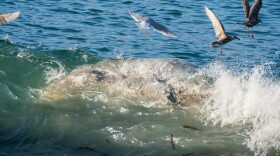-
A dead humpback whale was spotted in Unalaska Bay on Dec. 4, the third reported dead whale to wash up on the island since Oct. 16.
-
In its most recent meeting, the North Pacific Fishery Management Council said that funding and scheduling concerns could delay final action on chum bycatch until April 2026. The potential delay has been criticized by those who say that chum salmon crashes across Western Alaska, especially on the Yukon River, require swift action.
-
Alaska officials say the changes could make fishing less safe and undermine science critical to managing fisheries.
-
A federal judge has ruled that the Trump administration’s mass layoffs of thousands of workers were unlawful.
-
The U.S. Department of Agriculture will buy up to $50 million worth of Alaska pollock, according to the Alaska Seafood Marketing Institute. The estimated 15 million pounds of pollock will go toward supplying food banks and other food-aid programs around the country.
-
The murre die-off might have gone unexplained if it weren't for decades of observations from researchers and citizen scientists.
-
In this episode of "Island Interviews," Wolfang Matilda Tutiakoff shared with KUCB's Kanesia McGlashan-Price what researchers discovered underwater near Attu Island and their personal journey during the expedition. They also highlighted the cultural and emotional significance of reclaiming the island.
-
A weak La Niña system is predicted this winter, meaning meteorologists can't forecast whether the Aleutian Islands will experience higher or lower than normal temperatures and precipitation this season.
-
Black cod fishermen in the Bering Sea have reported an increase in orcas taking their catch off their fishing lines in recent years. Orca depredation isn't just a costly headache for fishermen — it can be dangerous for orcas, too.
-
The entangled humpback whale in Nateekin Bay has moved outside of the surrounding Unalaska Bay and is trailing a buoy.

Play Live Radio
Next Up:
0:00
0:00
Available On Air Stations










